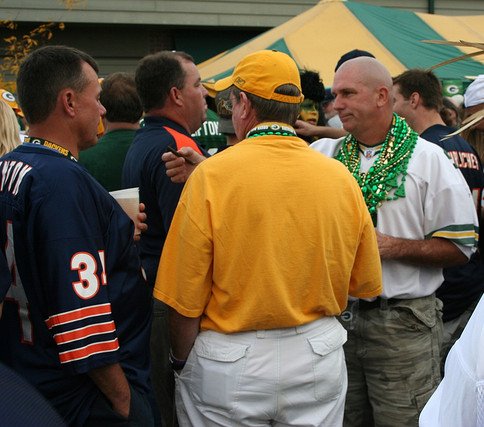The many factors which divide us are actually much more superficial than those we share. – Dalai Lama
What does that mean?
Just think about this quote, and it’s implications, for a moment. You may disagree with a family member over a sports team. You may differ from your neighbor in what brand of car you prefer. You might have a different idea about what is fashionable than your friends. Yet somehow we are still all human, and as such, more the same than different.
The point of this quote, in my opinion, is to recognise that we are all human. We share the same form; arms, legs, torso, fingers, toes, head. We share the same organs. We share the basic love of friends and family. The places where we differ is around the edges, and in the smallest quantity.
While these differences can easily cause friction (especially in sports season), we’re still far more alike than we are different. However, wars and killings still occur because of these tiny differences. The sadness it brings to mind, when you think of all the good the dead could have done, if only they had lived, is very real.
While I don’t expect wars and killings to stop overnight because of this quote, it would be nice if more people spent as much time thinking about this fact as they do about their hatred for each-other. I can hope, I can wish, I can dream, can’t I?
Why is understanding important?
Please know that I don’t expect everyone to agree about everything as we recognise this quote. I expect that fans of the Chicago Bears will still give grief to the fans of Green Bay Packers and vice versa (or insert your favorite sports rivalry here). That’s not going to happen.
If we can understand why they like their team (please, no jokes about being dropped on their head as a baby), hopefully we can look past that difference to the fact that we are passionate about our favorite sport, and that is something that we share, even if the teams divide us.
Similarly, how many people believe in a divine being, yet how many people die each year in a squabble over who’s version is the correct one? Our beliefs in a deity should bring us together, even if we see that being in a different manner.
How many people die because they are part of this group or that group, instead of the ‘proper’ group? Again, it is a focus on that which differs instead of that which is the same. Skin color? Ethnic origin? Religion? Tribal or governmental affiliation? What a waste.
Where can I apply this in my life?
Let’s start within ourselves. Can you learn to appreciate someone else for their love of a common endeavor or activity? Can the love of what you share in common overcome your dislike of their selection of team, side, or something else that would divide you?
Some friends of mine are really into car racing. They are constantly giving each-other grief over their preference in driver and team, yet when the race is over, they come together in their love of the sport. While that is a trivial example, it’s a place where anyone could start.
What other factors divide you from others in your family, your friends, or your neighbors? I would ask you to consider just how important those factors are. Are they really enough to engender animosity? Do any really rise to the point of dislike, or even to hatred?
If not, you might want to consider how you can mend fences, or at least have an honest discussion about the issue (or issues) at hand. It might not go well, as you both have to want better relations for it to work, but you can at least reach out to them and start the process.
They may be waiting, unsure of how you would react. It would be a shame to miss an opportunity to have a better relationship with someone simply because no one was willing to make the first move, even though both were desirous of the end result.
Now it’s time to do something tough, and to take a look deep into ourselves. What do we want to do going forward in our lives? Are we happy with our stance on what divisions we hold within ourselves? Are we proud of who we hate and why we hate them?
It can be a pretty ugly place to look, but if we wish to truly embrace the heart of the quote, I feel it is something we must do. Do you have a feeling about a group or type of people which you are reluctant to shout to everyone in your neighborhood, or post on social media for all to see?
If so, you might want to examine why you feel that way, an consider what you can do to change it. Remembering all the ways they are like us might help you feel a little more brotherly love towards them, no matter how different they may seem.
Remember, you don’t have to approve of them to love them. I love a lot of people, but I don’t agree with everything they believe or stand for. But we have more in common than we have differences. To me, that is the important thing to remember.
From: Twitter, @DalaiLama
confirmed at : it’s from his own feed…
Photo by Aff1737

